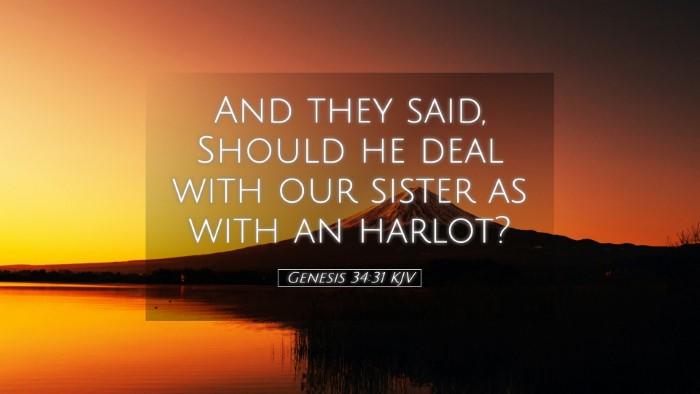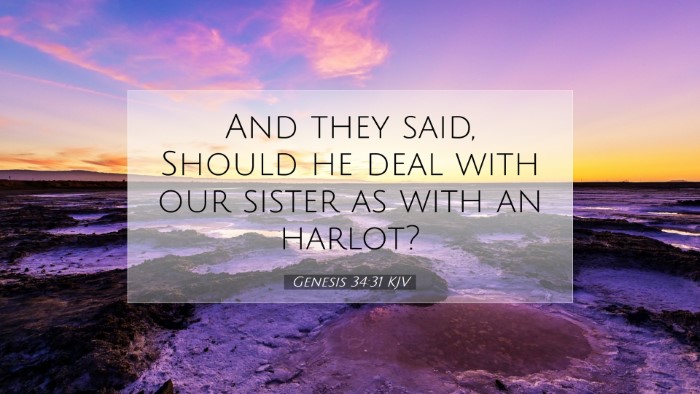Commentary on Genesis 34:31
Genesis 34:31 (KJV): "And they said, Should he deal with our sister as with a harlot?"
Contextual Overview
This verse comes at a pivotal moment in the narrative of Genesis, specifically following the events of Dinah's violation by Shechem and the subsequent wrath of her brothers. The context is not only one of familial honor and justice but also speaks to broader themes such as gender, violence, and cultural expectations.
The Broader Narrative
In Genesis 34, Dinah, the daughter of Leah and Jacob, goes out to see the daughters of the land and is noticed by Shechem, the son of Hamor the Hivite, who takes her and lays with her. This act sets off a series of violent retaliations by her brothers, Simeon and Levi, who deceitfully agree with Shechem’s request for Dinah’s hand in marriage but exact a heavy toll by killing him and all the men of his city. The verse in question captures their moral outrage and the gravity of the situation.
Insights from Commentators
Matthew Henry's Commentary
Matthew Henry emphasizes the impurity of Shechem’s actions, relating them to the dishonorable treatment of a woman. He points out that the brothers view the act as a grievous sin not only against Dinah but also against their family’s honor. Henry notes the depth of their indignation as they equate Shechem's actions with those performed by a harlot, a term that embodies shame and disgrace.
Henry further explores the familial duty to protect one’s kin, suggesting that Dinah’s brothers are compelled to act in defense of their sister’s honor. This reflects ancient Near Eastern values where family integrity was paramount.
Albert Barnes' Notes
Albert Barnes elaborates on the cultural implications of the term "harlot." He notes that in ancient societies, a woman’s purity was often linked to family honor, and any violation was seen as not just a personal affront but a community disgrace. Barnes interprets the outrage of Dinah's brothers as justified, considering the severity of Shechem’s actions.
Barnes also highlights the moral dilemma faced by the brothers. They grapple with questions of justice, retribution, and the consequences of their extreme response. Their actions stemmed from a desire to restore honor but also laid the ground for further violence, showcasing the cycle of vengeance.
Adam Clarke's Commentary
Adam Clarke presents a theological reflection on the nature of sin and justice in this passage. He argues that the phrase should he deal with our sister as with a harlot emphasizes their horror at the normalization of such violence against women. Clarke points out that their response is rooted not only in personal grief but also in a broader societal injustice against vulnerable individuals.
Clarke further discusses the societal implications of such conduct, suggesting that it prompts a theological reflection on God’s justice. He points out that the anger of the brothers can be seen not just as a personal vendetta but as an illustration of God’s concern for justice and righteousness in the face of moral corruption.
Theological Reflections
The verse poses critical questions regarding human dignity and the treatment of individuals within the context of familial and communal relationships. It highlights the societal pressures and expectations surrounding honor and shame, particularly concerning women.
This passage invites pastors and theologians to reflect on how contemporary societies mirror these ancient dynamics, where honor can sometimes beckon violence, and purity can be subjected to brutal treatment. Genesis 34:31 serves as a pivotal reminder of the ethical responsibilities towards safeguarding the dignity of others, especially those who are most vulnerable.
Applications for Today
- Restoration of Honor: The call for justice in domestic and social spaces resonates today, where issues of gender violence persist.
- Community Responsibility: The narrative urges communities to consider their role in protecting the marginalized and ensuring that acts of violence and immorality are not tolerated.
- The Role of Grace: There's a need to balance justice with mercy, a lesson that speaks to how we address sin within both personal and communal contexts.
Conclusion
Genesis 34:31 serves as a sobering reminder of the complexities surrounding human relationships and sin. In interpreting this verse, scholars, students, and pastors are called to engage deeply with the text, drawing out both historical context and contemporary relevance. The moral outrage expressed by Dinah's brothers not only reflects a righteous indignation but calls readers today to consider how they uphold justice and protect those wronged in society.


